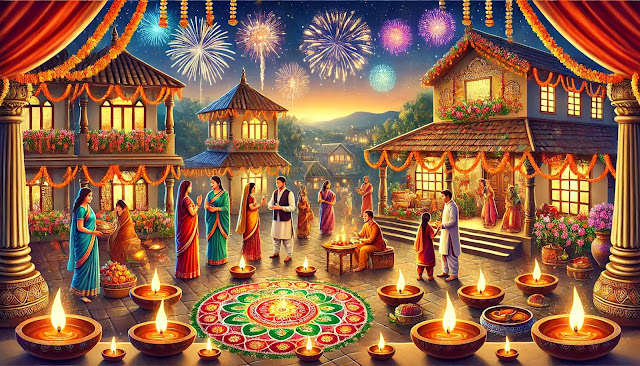The Essence of Diwali: Significance, Celebration, and Life Lessons
Diwali, also known as Deepavali or the Festival of Lights, is one of the most celebrated festivals in India and holds profound cultural, religious, and philosophical significance. Rooted in Hindu tradition but celebrated by people of diverse faiths, Diwali embodies themes of victory, renewal, and light. It is a five-day festival, with the third day marking the main celebration. Here’s a deeper look into why Diwali is celebrated, what it signifies, and how we can apply its lessons to our lives.
Why is Diwali Celebrated?
The origins of Diwali trace back to multiple legends in Hindu mythology, the most popular being the return of Lord Rama to Ayodhya after 14 years of exile. His return, along with his wife Sita and brother Lakshman, signified the triumph of good over evil, as he defeated the demon king Ravana. The people of Ayodhya welcomed them by lighting oil lamps (diyas) to celebrate this victorious homecoming. Diwali is also associated with the goddess Lakshmi, the deity of wealth and prosperity, making it an occasion for new beginnings and financial well-being.
Beyond Hinduism, Diwali holds significance in other religions as well. In Jainism, it marks the day Lord Mahavira attained Nirvana. In Sikhism, it commemorates the release of Guru Hargobind Singh Ji from prison. This multi-faceted history makes Diwali not just a festival of lights, but a celebration of liberation, joy, and hope.
What Diwali Signifies
Diwali is celebrated by lighting diyas, decorating homes, offering prayers, and spending time with loved ones. At its core, Diwali symbolizes:
The Victory of Light over Darkness – Diwali is a reminder that light always prevails, even in the darkest times. The lighting of diyas represents this symbolic victory.
The Triumph of Good over Evil – Lord Rama’s victory over Ravana is a testament to the ultimate victory of righteousness.
The Power of New Beginnings – Diwali often coincides with the Hindu New Year and is a time for fresh starts, both materially and spiritually.
Spiritual Prosperity – Diwali isn’t just about material wealth; it’s about enriching our spiritual lives, seeking inner peace, and fostering positive connections.
10 Life Lessons We Can Learn from Diwali
Embracing the essence of Diwali can inspire us to live more meaningful, purpose-driven lives. Here are ten ways to apply Diwali's teachings:
Shine Your Light
Just as diyas illuminate homes, strive to bring light to others’ lives. Be a source of positivity, kindness, and support. Acts of compassion and understanding can be a beacon for those going through tough times.Embrace New Beginnings
Diwali signifies renewal and a fresh start. Practice letting go of past grievances and resentments. Embrace change, set new goals, and approach challenges with a renewed perspective.Practice Gratitude
Diwali is a time for prayer and reflection, reminding us to appreciate the blessings in our lives. Cultivate a habit of gratitude to bring contentment and positivity into everyday life.Celebrate Diversity and Inclusivity
Diwali is celebrated by people of various faiths. Let this remind us to embrace diversity, respect others' beliefs, and practice inclusivity, making the world a more harmonious place.Stay Grounded in Values
Lord Rama's life is marked by his adherence to dharma (righteousness). Similarly, ground yourself in honesty, empathy, and moral values, even when the path may be difficult.Overcome Negativity
Just as Diwali celebrates good over evil, make an effort to overcome negative habits, fears, or thoughts. Regularly detox from negative influences, whether they’re people, habits, or situations.Invest in Relationships
Diwali is traditionally celebrated with family and friends. Cherish your relationships and invest time in nurturing them. Communicate openly and express your love and appreciation for those who matter.Pursue Prosperity in All Forms
While financial stability is important, Diwali reminds us that prosperity is also about mental peace, health, and happiness. Seek a balanced life by setting time for self-care, hobbies, and intellectual growth.Give Back to Society
Diwali is also about charity and giving to those in need. Whether it’s volunteering, donating, or simply helping someone in need, practice acts of kindness. The joy of giving enriches both the giver and the receiver.Protect the Environment
Diwali traditionally involved earthen lamps and simple celebrations. In modern times, being mindful of the environment by reducing pollution and waste is crucial. Choose sustainable practices, like opting for eco-friendly decorations and avoiding excessive fireworks.
Concluding Thoughts
Diwali is more than just a festival; it’s a celebration of hope, light, and transformation. As we light diyas and decorate our homes, let’s remember the deeper meanings behind this beautiful festival. By adopting these values, we can bring the spirit of Diwali into our lives year-round, fostering a world that is brighter, kinder, and more compassionate.




